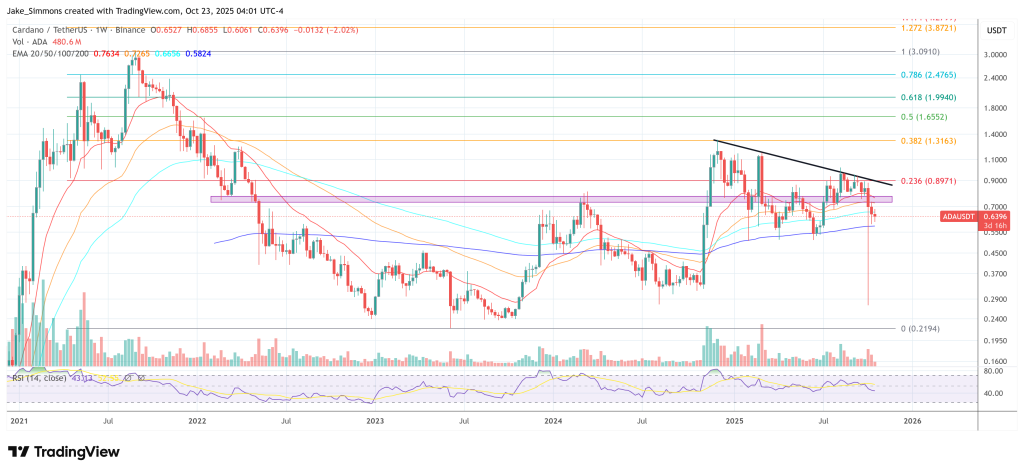The Cardano Basis is getting ready to use for 2 generic top-level domains—“.ada” and “.cardano”—within the subsequent ICANN software spherical, positioning the community’s model and identification nearer to the core addressing layer of the net.
In a discussion board announcement dated 21 October 2025, the Basis stated it intends to submit functions in Q1 2026 and can finance the trouble fully from its personal assets, not the Cardano Treasury. “The Cardano Basis plans to use for the registration of the .ada and .cardano gTLDs,” the publish states, including that the initiative has been scoped since 2023, when ICANN signaled a brand new software window for gTLDs.
Cardano Goals For Its Personal Nook Of The Net
The transfer would convey Cardano into a comparatively small cohort of blockchain ecosystems that management their very own top-level namespace quite than relying solely on third-party registries or Web3-native naming techniques. The Basis frames the functions as each defensive and strategic: securing Cardano-specific string(s) ought to scale back the chance of brand name misuse whereas creating an on-ramp for identification and interoperability options that bridge Web2 and Web3.
If authorized, these domains would perform like some other gTLD, which means ecosystem contributors might register second-level names similar to “vespr.ada” or “nmkr.cardano,” with the registry operated underneath insurance policies the Basis says it’s going to publish and report on usually.
Past model management, the Basis emphasizes potential product-level integrations. It explicitly highlights “simplified pockets addresses,” integration with decentralized identification options “like Veridian,” and even “area tokenisation” as areas it needs to discover.
The publish additionally notes energetic conversations “with Ada Handles and Handshake to discover use instances that bridge conventional DNS and Cardano.” These examples counsel the registry might function an anchor for human-readable identifiers that resolve to blockchain credentials, cost endpoints, or verifiable credentials, all throughout the governance and safety constraints of ICANN’s DNS.
The Basis says a multi-disciplinary staff has been shaping the plan, together with consultations with group consultants and vendor evaluations for each the appliance course of and future registry operations. Operationally, it proposes a Neighborhood Advisory Group to information coverage and improvement, and commits to “usually publishing figures on the gTLDs’ operation,” according to its current transparency stories.
It additionally floats the chance that internet returns, if any, could possibly be funneled again into broader ecosystem work. Whereas the publish underscores that “there is no such thing as a assure of success,” it argues the chance is justified by the strategic upside and the once-in-a-decade nature of ICANN’s software home windows.
Financially, the Basis supplies an unusually detailed price define. It estimates one-time software prices of roughly $700,000 for the 2 strings, comprising roughly $500,000 in ICANN charges and $200,000 for software assist. It then initiatives about $350,000 in annual mounted prices to function the registries, break up between ICANN charges and registry software program/licensing on one facet and advertising and marketing/enterprise improvement/overhead on the opposite. Variable prices, similar to per-domain operations, would depend upon gross sales quantity and are anticipated to be offset by area income. The publish reiterates, “The Cardano Basis will cowl all prices immediately,” and “won’t ask for Cardano Treasury funds.”
To floor sentiment and produce a public sign that may be cited within the software file, the Basis has submitted an “Data Motion” for group voting. It asks stake pool operators and DReps to assist the measure, arguing that seen endorsement can bolster the credibility of a community-based software in ICANN’s overview course of. “Please forged your vote,” the assertion urges, including that, if the Data Motion passes, the Basis will proceed to file functions for each strings in Q1 2026.
As with most governance-adjacent proposals in Cardano, the plan has already prompted debate. In the identical discussion board thread, a group member defined a “no” vote, citing considerations about Basis governance and the focus of affect, notably after the Basis’s heavy voting in Catalyst Fund 13.
The commenter wrote: “I voted no on this information motion,” and argued that the “scale of CF’s voting energy… undermined the ideas of decentralised governance,” suggesting an impartial, community-governed not-for-profit could be a greater registrar. Whereas a single publish doesn’t represent a consultant pattern, it captures the contours of skepticism the Basis may have to deal with which have been fueled by IOG founder Charles Hoskinson prior to now.
At press time, ADA traded at $

Featured picture created with DALL.E, chart from TradingView.com

Editorial Course of for bitcoinist is centered on delivering totally researched, correct, and unbiased content material. We uphold strict sourcing requirements, and every web page undergoes diligent overview by our staff of prime know-how consultants and seasoned editors. This course of ensures the integrity, relevance, and worth of our content material for our readers.




